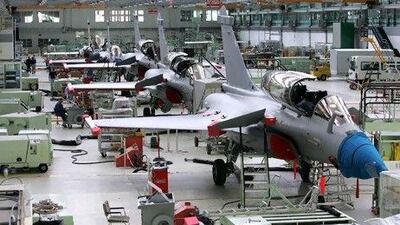"Incredible India" is the title of a ubiquitous advertising campaign that promises surprises around every corner, and the motto certainly applies to the country's ongoing fighter jet competition.
The American favourites, Lockheed Martin's F-16 and Boeing's F-18, were eliminated from the race after extensive trials.
But lesser-known jet fighters on the international export market, the French-made Dassault Rafale and the pan-European Eurofighter Typhoon, remain in the running.
India's fighter jet competition is a jewel in the crown of the global defence industry, with sales of 126 aircraft worth more than US$10 billion (Dh3.67bn) up for grabs, just one part of the country's enormous demand for military equipment during the coming decades.
The bonanza from India comes at a time when contracts are becoming rare in the West as governments adopt tough austerity measures.
The decision to rule out the American competitors seemingly defies conventional wisdom on arms sales - that nations should favour US technology because it helps their relations with the superpower.
"Fighter jet sales are always, always political matters," says Eric Trappier, the executive vice president for international business at Dassault Aviation.
Europe's success so far in the Indian market just may underscore the feeling that when it comes to defence sales, sometimes it is good not to be from the US.
Charles Edelstenne, the president of Dassault Aviation, says countries are wary of relying too much on the US, whose arms sales are heavily influenced by American policy towards the politics of potential buyers, leaving nations vulnerable if the American political landscape is changed by congressional elections.
"India's aircraft policy is not to put all eggs in one basket - and that basket is the American basket," says Mr Edelstenne, noting that India is already planning to spend billions of dollars on military cargo planes and helicopters from the US company Boeing.
"Even if a country receives promise of support from the US president, that doesn't guarantee you anything at all.
"The power is in the Congress, and at any time, the Congress can change its mind, and they can decide to block armaments, spare parts, whatever they want," Mr Edelstenne says.
By contrast, Dassault and France "stay neutral", Mr Edelstenne says. "We do not have the willingness to decide on the foreign policy of our buyer. It is their policy, not ours," he says.
In other cases, countries often chafe at the restrictions placed on exported US technology, or the lengthy approvals process required by the US government.
In a recent interview on the forum PakistaniDefence.com, a Pakistani F-16 fighter pilot spoke of the lengths to which the US goes to keep its technology a secret from countries such as China.
"They have put digital seals [on] all the sensitive technologies, which can only be opened via a code, which only they know," the pilot says.
"If there is a malfunction or these parts need to be serviced, they will be taken out … and shipped back to the US for repairs and servicing."
While the US is out of the competition in India, political considerations continue to surface, with Eurofighter battling a relationship between Dassault and India dating back to the early 1950s.
"I can easily imagine countries would want the chance to start new alliances, and that is what the Eurofighter programme offers," says Lars Jorgensen, a market analyst and business development executive at Eurofighter, whose shareholders include BAE Systems of the UK, Alenia Aeronautica of Italy, and the pan-European group EADS.
"Our company is backed by the British, Germans, Italians and Spanish," Mr Jorgensen says.
Dan Darling, a Middle East defence analyst at the US research company Forecast International, says every government lobbies heavily on behalf of its defence companies.
"Both the British and French governments bring as much diplomatic and political pressure to bear on foreign governments regarding defence sales as do their American counterparts," he says.
"The British government was central to the Project Salam agreement between Saudi Arabia and BAE Systems regarding the $9bn sale of 72 Eurofighter Typhoons to Riyadh in September 2007," Mr Darling says.
As the competition heats up in India, where a decision is expected by the end of this year, the Dassault- Eurofighter rivalry is being played out in other venues as well. Each is jockeying for advantage in Switzerland and the UAE.
While the UAE Air Force has spent the past three years evaluating the Rafale for a proposed 60-jet order, the Eurofighter team has watched for an opportunity, and in February gave the UAE a technical briefing on the fighter jet.
As for Lockheed Martin, the elimination of the F-16 jet will not seriously hurt the company, according to Douglas Royce, an aviation analyst at Forecast International.
"Lockheed Martin would have liked to have seen a new F-16 line in India, but its work on the F-35 programme will keep it in the fighter business for years to come," he says.
"The loss in India was not critical to its future."
But Boeing missed out on adding another key customer for the F-18 programme after only notching up Australia as a recent buyer.
"The impact of the loss in India is mitigated by having the US navy as a customer in the near term," Mr Royce says, "but long-term outlook for the programme would have been helped by winning the competition."

